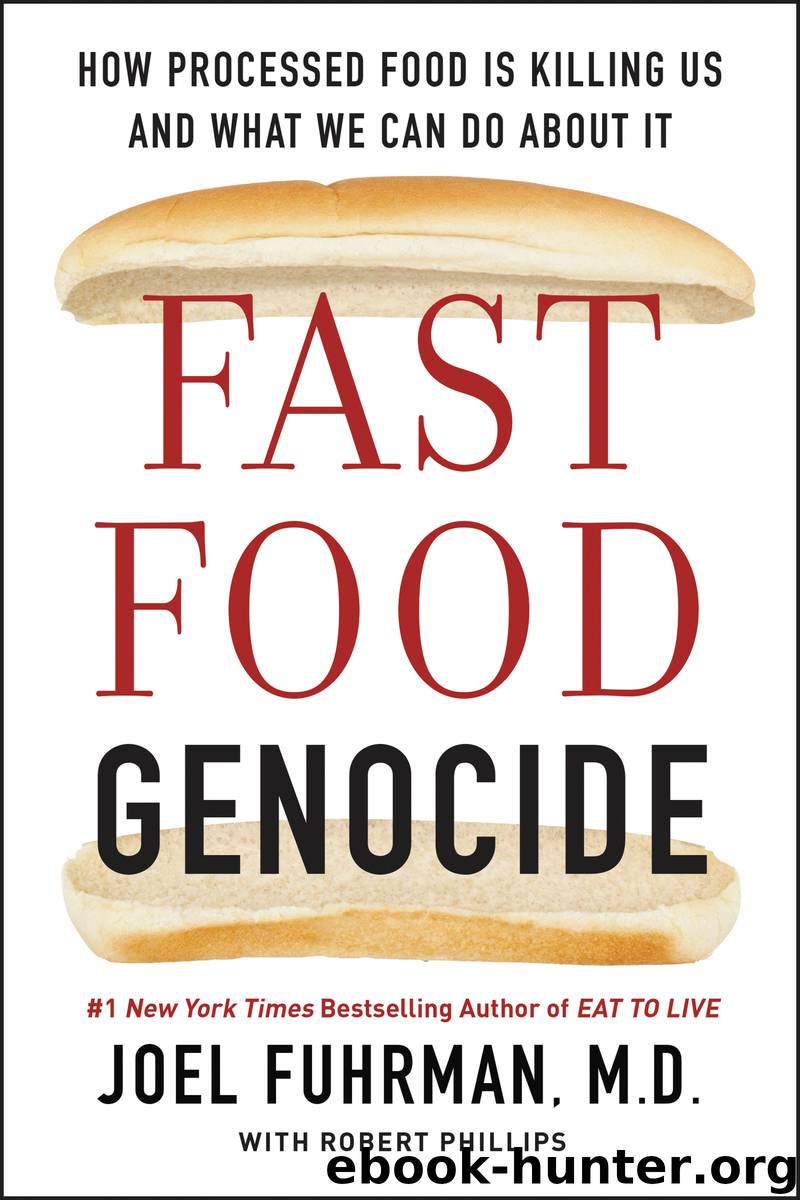Fast Food Genocide by Joel Fuhrman M.D. robert phillips

Author:Joel Fuhrman, M.D., robert phillips
Language: eng
Format: epub
Published: 2018-12-29T16:00:00+00:00
FAST FOOD IS ADDICTIVE
Consuming fast food is legal and socially acceptable. But these foods, rich in added sweeteners, salt, oils, and artificial flavoring (called “highly palatable foods” by scientists) have addictive properties. Eating a little makes you want more. Overeating and substance/drug abuse share important common characteristics, including tolerance (needing greater amounts over time to reach the same “high”), unsuccessful efforts to cut back on consumption, and use of the substance despite negative consequences. 13
Sugar-izing all foods to reach the “bliss point” that maximizes pleasure (and purchases), leads to a gradual deadening of the taste buds. Over time, this has two negative consequences: First, you crave more and more sugar; and second, the level of sweetness in natural foods (such as berries and carrots) no longer has any appeal. Children raised on fast food meals, soda, and frequent junk food treats do not like fruits and vegetables. Why? Because they can hardly taste these foods. Their taste buds have been shut down by excess salt and sugar and simply can’t register the nuances of flavors in real food.
Fast food prevents you from tasting the naturally delicious flavors of fruits and vegetables; therefore, the very foods that provide the body with the necessary nutrients to thrive and live a long, healthy life are made less desirable by human-made processed foods designed to cultivate addictive consumption.
Feeding sweetened soda, doughnuts, cake, and junk food to children is practically the same as handing them a shot of whiskey or lighting up a cigarette for them. There is just a small degree of difference between one addictive, dangerous substance and another. The same brain centers are stimulated by cocaine, narcotics, and super-sweetened foods. It is debatable which is more deadly, as so many people eat super-sweetened foods multiple times a day, every day.
Drugs and food can have similar effects in the brain. 14 We don’t eat solely because we’re hungry; we crave the pleasurable feelings we derive from food. Dopamine is a neurochemical that regulates motivation, pleasure, and reinforcement related to certain stimuli, such as food. The
Download
This site does not store any files on its server. We only index and link to content provided by other sites. Please contact the content providers to delete copyright contents if any and email us, we'll remove relevant links or contents immediately.
Nutrition for Sport, Exercise, and Health by Spano Marie & Kruskall Laura & Thomas D. Travis(3785)
Nutrition for Sport, Exercise, and Health by Marie Spano & Laura Kruskall & D. Travis Thomas(3734)
The Sprouting Book by Ann Wigmore(3593)
Flavor Flours by Alice Medrich(2868)
Superfood Smoothie Bowls: Delicious, Satisfying, Protein-Packed Blends that Boost Energy and Burn Fat by Chace Daniella(2485)
Memory Rescue by Daniel G. Amen(2426)
Dirty Genes by Ben Lynch(2318)
The Bad Food Bible by Aaron Carroll(2275)
Genius Foods by Max Lugavere(2222)
The Poisoner's Handbook by Deborah Blum(2142)
Good Calories, Bad Calories by Gary Taubes(2113)
The Main Street Vegan Academy Cookbook by Victoria Moran(2089)
The I Quit Sugar Cookbook by Sarah Wilson(2042)
Core Performance Essentials by Mark Verstegen(2015)
Memory Rescue: Supercharge Your Brain, Reverse Memory Loss, and Remember What Matters Most by Amen Dr. Daniel G(1980)
Big Girls Do It Stronger by Jasinda Wilder(1964)
Android App Development by Franceschi Hervé J.;(1845)
Sugar Crush by Dr. Richard Jacoby(1801)
Dr. Colbert's Keto Zone Diet by Don Colbert(1654)
